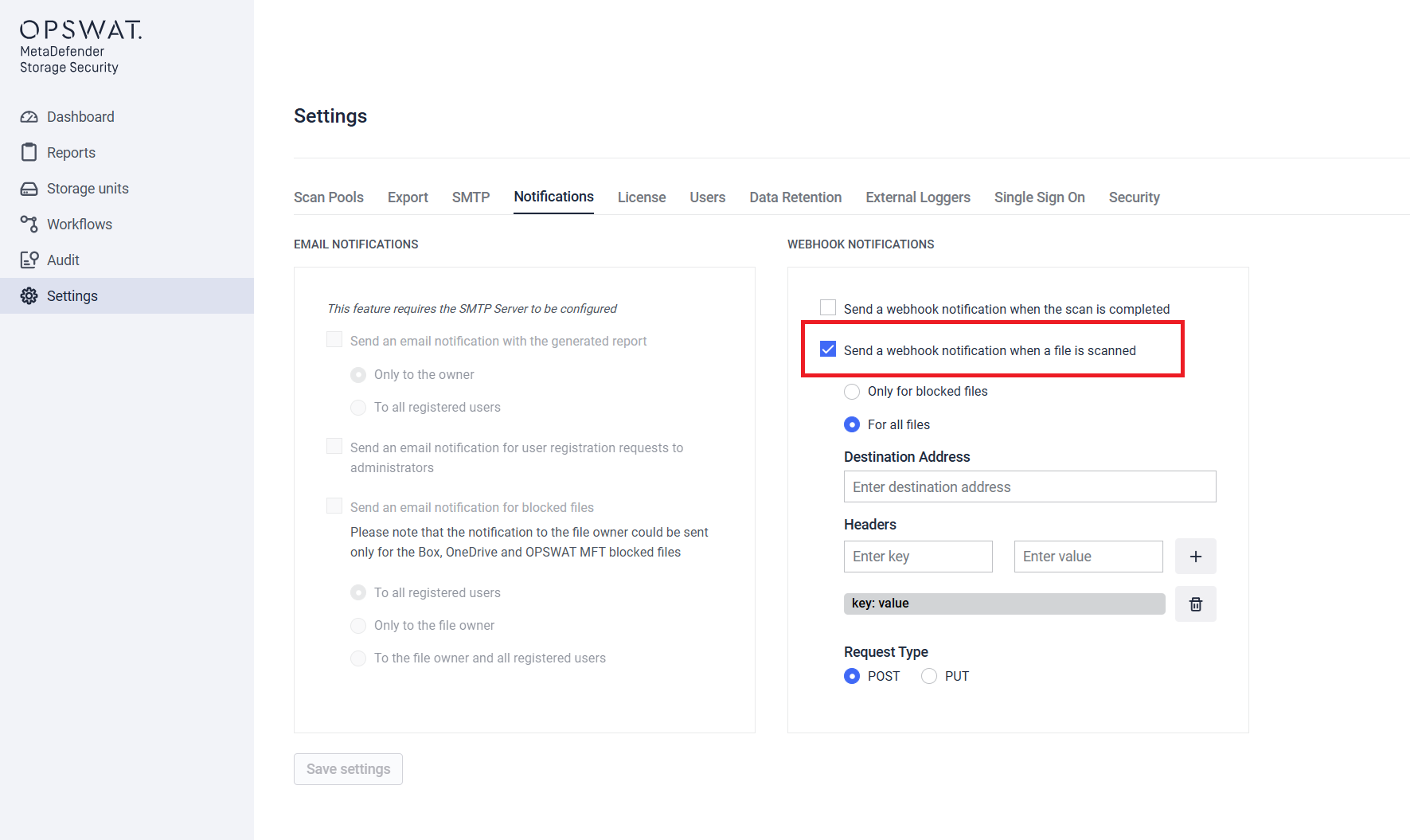Overview
File Scanned webhook notifications allow you to receive real-time alerts whenever a file has been scanned by MetaDefender Storage Security. This feature is useful if you need to:
- Track the outcome of file scans for auditing or compliance.
- Integrate scan results into external systems (e.g., ticketing, alerting, SIEM).
- Trigger automated workflows based on file status (e.g., quarantine, user notification).
Setup
- Go to Settings > Notifications in the MetaDefender Storage Security console.
- Select Send a webhook notification when a file is scanned under the Webhook Notifications section
- Choose whether you want to receive notifications for all scanned files or only blocked files.
- Enter the Destination Address (your endpoint).
- Select the Request Type (POST or PUT).
- (Optional) Add any custom HTTP headers.
- Save the configuration.

Configuration Details
- Destination address – The URL of the receiving system (must accept HTTP requests).
- Request type – Either
POSTorPUT. - Headers – Optional key-value pairs (e.g.,
Authorization: Bearer <token>). - Notification scope – Choose between:
- All scanned files → You will receive a notification for every file scanned.
- Blocked only → You will only receive notifications when a file is marked as blocked in MetaDefender Storage Security (see File Definition)
Webhook Payload
When triggered, the webhook sends a JSON request body to your configured endpoint.
{ "FileId": "0198f02f-ed4d-7c0d-8668-1036d322209c", "FileName": "file.txt", "FilePath": "folder/file.txt", "FileStatus": "Allowed", "CoreScanResult": "No Threat Detected", "FileState": "Available", "RemediationResult": [ "AllowedKept: Applied" ], "ScanCompletedTimeStamp": "2025-08-28T10:20:24.974998Z", "WorkflowName": "Default Workflow", "Rules": [ "MetaDefender Storage Security" ], "ExceptionDetails": "", "RemediationErrors": [], "WebhookNotificationType": "FileScanned"}Field Reference
| Field | Type | Example Value | Description |
|---|---|---|---|
FileId | string (UUID) | 0198f02f-ed4d-7c0d-8668-1036d322209c | Unique identifier of the file. |
FileName | string | file.txt | Original file name. |
FilePath | string | folder/file.txt | File's relative path. |
FileStatus | string | Allowed /Blocked | File status based on MDSS file definitions |
CoreScanResult | string | No Threat Detected | Result from Scan instance. |
FileState | string |
| File status in MDSS. |
RemediationResult | array[string] | ["AllowedKept: Applied"] | Array of remediations applied and their result |
ScanCompletedTimeStamp | datetime (UTC) | 2025-08-28T10:20:24.974998Z | Time when scan completed. |
WorkflowName | string | Default Workflow | Name of the workflow used. |
Rules | array[string] | ["MetaDefender Storage Security"] | Workflow rules applied. |
ExceptionDetails | string | "" | Details of any exceptions during scan. |
RemediationErrors | array[string] | [] | Errors during remediation, if any. |
WebhookNotificationType | string | FileScanned | Identifies the notification type. |
Delivery Behavior
- Webhooks are delivered as standard HTTP requests.
- Delivery is best-effort → if the destination is invalid, the request is logged in the Audit page, but no retries are performed.
- Payload size is typically small (JSON only, no file contents).
Security Considerations
- Configure HTTPS endpoints to ensure data is transmitted securely.
- Use authentication headers (e.g., API tokens) to protect your webhook endpoint.
- Ensure your endpoint validates payloads before processing.
Troubleshooting
- No webhook received → Verify the endpoint URL and request type (POST/PUT).
- Audit shows delivery failed → Endpoint is invalid. Fix and test again.
- Authentication errors → Confirm your endpoint accepts the headers you configured.

